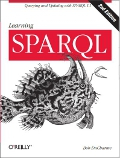I'm very excited to announce a new semantic web conference, which I'll be chairing: Semantic Web Strategies, which will be held in San Jose on October 1st and 2nd. Jupiterevents, a division of the venerable Jupitermedia, is doing all the infrastructure work of the conference, while I get to mostly stick to the fun parts.
![[Semantic Web Strategies logo]](http://www.semanticwebstrategies.com/images/logo_SWS_hdr.gif)
I mentioned them when they first contacted me because they were also looking for someone to report on developments in the semantic web world. As I said then, it's a good sign when organizations like theirs start paying attention to the field of semantic web work, because it means that they see some real growth ahead.
There are already several conferences that address semantic web topics, and the presence of another pushes the field up the hype curve a little. What makes this conference different? I think its title distinguishes it from the Semantic Technology Conference, which is probably the most comparable one out there—instead of focusing on the technology, this one will focus on semantic web strategies. We want to provide a forum for people to share stories about their past experiences, long-term plans, and short-term plans for semantic web-related applications and the relationship of these applications to their business plans. To string together some clichés, we want to hear lessons learned, war stories, success stories, and reports from the trenches about past, current, and future work.
These stories don't have to be about implemented projects directly tied to your organization's business plan; they can be about skunkworks projects done under the radar (if you'll pardon a few more clichés) that never got finished. Few projects are complete successes or complete failures, and assuming that yours falls in between, we want to hear about what worked, what didn't, and what would have worked better if certain things had been in place—for example, tools or standards support that you didn't see then but do now, or more support from certain areas of your organization that didn't understand what you were doing. What decisions did you have to make? Which aspects turned out to be more, or less important than you originally anticipated?
The metadata world has several examples of different groups working on similar projects with few connections to other groups doing related work, and as this work leads them to investigate semantic web tools, I'd like to have some panels that get representatives of these different groups together. For example, who's working on metadata about images? the W3C's Multimedia Annotation in the Semantic Web Task Force, the museum industry, the Library of Congress, Idealliance's PRISM activity with their DIM2 work for the publishing industry, the insurance industry, and more. They each have different business needs, but they need to track similar resources, and as each of these groups starts investigating semantic web work, they can find ways to take advantage of each other's work to benefit all the groups. People ask me what kind of audience the conference is shooting for, and I think it will have the greatest benefit if we gather different people from different worlds: the financial industry, biology and pharmaceutical research, the government, the military, the publishing industry, and the corresponding academic fields for each of these.
In your own semantic web work, what are you proudest of? What do you regret the most? What do you know now that you'd wish you known when you started this work? Come share what you've learned and learn from others by submitting a proposal. (No paper required!) I'm really looking forward to this.

